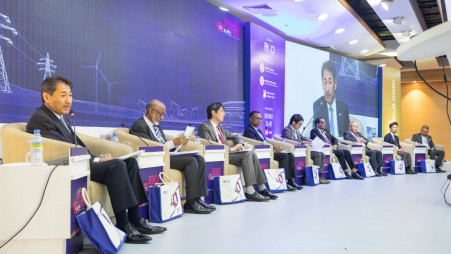
Japanese entrepreneurs are willing to invest more in Bangladesh to take advantage of available manpower and market access facilities, as well as explore the potential of the local market, according to business leaders, envoys, and policymakers from Japan.
“About 70% of Japanese companies in Bangladesh have expressed their willingness to expand their investment in one to two units,” said Yasutoshi Nishimura, minister of economy, trade, and industry of Japan, in a video message at a parallel session styled “Japan-Bangladesh Trade and Investment: Opportunities and Way Forward” at the Bangladesh Business Summit 2023 on Sunday.
To mark its 50th founding anniversary, the Federation of Bangladesh Chambers of Commerce and Industry (FBCCI) has organised the three-day summit beginning on 11 March in partnership with the foreign and commerce ministries and the Bangladesh Investment Development Authority (Bida) at the Bangabandhu International Conference Center in Dhaka.
“Many Japanese companies are interested in investing in Bangladesh. In 2021, foreign direct investment (FDI) from Japan reached a high of $910 million,” the minister said, adding that apart from the textile industry, the companies are also investing in the automobile, motorcycle, energy, and IT sectors to diversify the industries of Bangladesh.
Many Japanese companies are contributing to developing infrastructure in Bangladesh, like the Jamuna Bridge, Matarbari Deep Seaport, and the expansion of the Dhaka International Airport, said the Japanese minister.
In the keynote presentation, Takeshi Mamiya, managing executive officer of Marubeni ASEAN Pet Ltd, said a number of Japanese companies are providing high-efficiency technology support to produce high-value products like outerwear and suits.
Bangladesh is set to graduate from LDC status by 2026, and entering the Economic Partnership Agreement (EPA) with Japan is most important for Bangladesh’s continued development of textile industries, he added.
Thanks to a joint study group launched last December between the two governments, Bangladesh’s RMG exports to Japan will not be affected after LDC graduation, hoped Takeshi Mamiya.
The Japanese government and Japan International Cooperation Agency (Jica) are committed to providing concessionary loans for the infrastructure development of Bangladesh, as infrastructure is the backbone of a nation’s development, he added.
“There are more than 5,000 Japanese companies operating their businesses in Thailand, 2,000 in Vietnam, and 1,500 in Indonesia, while in Bangladesh, only 340 companies are registered due to physiological distance,” said the managing executive officer of Marubeni, and he hoped this business summit would help to reduce this physiological distance.
He urges the government to develop a policy to create an environment that acts as a level playing field to attract foreign investment, and Bangladeshi companies may join hands with Japanese companies to invite them to Bangladesh for knowledge and technology transfer.
Taro Kawachi, managing director of Bangladesh Special Economic Zone (SEZ) Ltd, said in the last one year 175 Japanese companies have visited their SEZ, registering visitor arrival growth of about 400% compared to a year ago.
This economic zone aims to facilitate Japanese quality in Bangladesh to attract investment, he said, adding that they started a part of the zone in December last year and that already three Japanese companies, including Singer, have invested here.
Myungo-Ho Lee, president of the Japanese commerce and industry association in Dhaka and general manager of Mitsubishi Corporation’s Dhaka office, said 10 Japanese companies are joining this business summit from outside the country to explore the investment opportunity.
Abdul Haque, an advisor at FBCCI, said that by cashing in on Japanese investment, Taiwan, Vietnam, Indonesia, and Malaysia have made significant progress in their industrialisation and export diversification.
He said Bangladesh has a chance to bring more Japanese investment by establishing a special economic zone for Japanese investors, and many investors may come in the days to come. The government should reform policies and rules to make them investment-friendly.
The next ten years will be very crucial for Bangladesh, he said, adding, “We must take all reforms in the Japanese standard to promote investment.”
Japanese Ambassador Kiminori Iwama also spoke at the event, while foreign minister AK Abdul Momen sent a video message and Lokman Hossain Miah, executive chairman of Bida, made the introductory remarks.
Source: The Business Standerd

